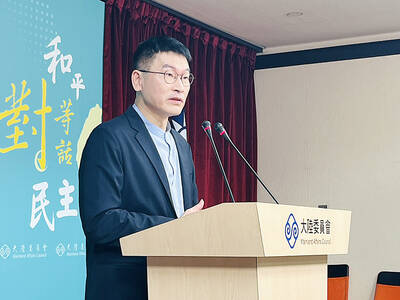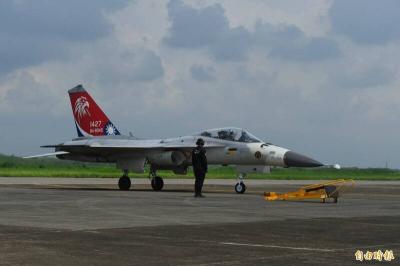Government officials reacted cautiously to former Chinese president Jiang Zemin's (江澤民) resignation from the chairmanship of China's Central Military Commission yesterday and warned against excessive optimism in cross-strait developments after Jiang's departure.
Jiang's resignation and Chinese President Hu Jintao's (胡錦濤) succession to China's top military post sparked a flurry of reactions among Taiwanese officials. "This vital step probably won't affect Beijing's Taiwan policy," said Chiu Tai-san (邱太三), vice chairman of the Mainland Affairs Council. Any change in China's Taiwan policy is likely to remain unclear until the after the US presidential election and Taiwan's legislative elections are concluded, Chiu said. Jiang's move consolidated the leadership of Hu and Chinese Premier Wen Jiabao (溫家寶), according to Chiu.
"China will possibly set economic development as the country's top priority, but if this is true, it remains to be seen whether Taiwan will remain high on Beijing's priority list," he said.
The new leadership in Beijing, added Chiu, bears more good than bad news to Taiwan. The leaders tend to make group decisions, which would prevent the government from making hasty decisions, Chiu added.
"Although Jiang has stepped down, he still retains a certain level of influence. It is unlikely Hu would be able to fully control the military, making China's Taiwan policy virtually unchangeable in the short term," said Cabinet spokesman Chen Chi-mai (陳其邁).
"Jiang's Eight Points" principle will remain the guideline for Beijing's policy toward Taiwan, according to Chen.

LOW RISK: Most nations do not extradite people accused of political crimes, and the UN says extradition can only happen if the act is a crime in both countries, an official said China yesterday issued wanted notices for two Taiwanese influencers, accusing them of committing “separatist acts” by criticizing Beijing, amid broadening concerns over China’s state-directed transnational repression. The Quanzhou Public Security Bureau in a notice posted online said police are offering a reward of up to 25,000 yuan (US$3,523) for information that could contribute to the investigation or apprehension of pro-Taiwanese independence YouTuber Wen Tzu-yu (溫子渝),who is known as Pa Chiung (八炯) online, and rapper Chen Po-yuan (陳柏源). Wen and Chen are suspected of spreading content that supported secession from China, slandered Chinese policies that benefit Taiwanese and discrimination against Chinese spouses of

ALIGNED THINKING: Taiwan and Japan have a mutual interest in trade, culture and engineering, and can work together for stability, Cho Jung-tai said Taiwan and Japan are two like-minded countries willing to work together to form a “safety barrier” in the Indo-Pacific region, Premier Cho Jung-tai (卓榮泰) yesterday said at the opening ceremony of the 35th Taiwan-Japan Modern Engineering and Technology Symposium in Taipei. Taiwan and Japan are close geographically and closer emotionally, he added. Citing the overflowing of a barrier lake in the Mataian River (馬太鞍溪) in September, Cho said the submersible water level sensors given by Japan during the disaster helped Taiwan monitor the lake’s water levels more accurately. Japan also provided a lot of vaccines early in the outbreak of the COVID-19 pandemic,

PROMOTION: Travelers who want a free stopover must book their flights with designated travel agents, such as Lion Travel, Holiday Tours, Cola Tour and Life Tours Air Canada yesterday said it is offering Taiwanese travelers who are headed to North America free stopovers if they transit though airports in Japan and South Korea. The promotion was launched in response to a potential rise in demand for flights to North America in June and July next year, when the US, Canada and Mexico are scheduled to jointly host the FIFA World Cup, Air Canada said. Air Canada offers services to 13 of the 16 host cities of the tournament’s soccer games, including Toronto and Vancouver; Mexico City, Guadalajara and Monterrey in Mexico; Atlanta, Georgia; Boston; Dallas; Houston;

The US approved the possible sale to Taiwan of fighter jet spare and repair parts for US$330 million, the Pentagon said late yesterday, marking the first such potential transaction since US President Donald Trump took office in January. "The proposed sale will improve the recipient's capability to meet current and future threats by maintaining the operational readiness of the recipient's fleet of F-16, C-130," and other aircraft, the Pentagon said in a statement. Trump previously said that Chinese President Xi Jinping (習近平) has told him he would not invade Taiwan while the Republican leader is in office. The announcement of the possible arms